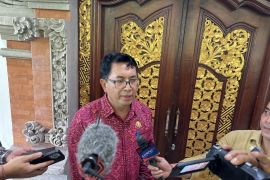Jakarta (Antara Bali) - Indonesia's raw material imports in May 2015 declined by 7.4 percent compared with those in the previous month, the Trade Ministry said.
The country's cumulative imports also dipped 9.7 percent in the January - May 2015 period if compared with those in corresponding period a year ealier.
The trade ministry said in a press statement on Wednesday that the decline in the raw material imports in the January - May 2015 period was fueled by the fall of oil and gas demand by 42.8 percent.
It said that oil imports slumped by 44.4 percent and crude by 41.9 percent.
January - May imports were dominated by auxiliary goods (75.8 percent) whose value declined by 18.9 percent year-on-year (yoy).
Auxiliary goods whose imports drastically fell included organic chemicals; oily grains; rubber and rubber-based products; iron, steel and pulp.
Capital good imports also shrank by 14.6 percent in the January - May 2015 yoy so that the import ceiling was recorded at 17.2 percent.
Machinery/mechanic instrument, machinery/electric appliance and motor vehicles were among capital goods which experienced a significant import decline.
The government managed to curb fuel imports in May, causing the trade balance to record a surplus of US$955 million, Trade Minister Rachmat Gobel said earlier.
"As we could curb the demand for imported oils in May, there was an improvement in the surplus of our balance of trade," he affirmed in a press statement released on Wednesday.
The trade surplus in May increased significantly as compared to the US$477.4 million recorded in April, Gobel added.
Total imports in May reached US$11.6 billion, a 21.4 percent drop from that in the same month last year, he pointed out.
The decline in imports was fueled by decreasing demand for imported crude oil and oil products, which plummeted 54.1 percent and 40.6 percent, respectively, the minister stated.
Cumulatively, the balance of trade from January to May recorded a surplus of US$3.8 billion. This was fueled by a trade surplus in the non-oil/gas sector, which reached US$5.7 billion.
However, the balance of trade in the oil and gas sector suffered a deficit of US$2 billion.
The minister further noted that the growth of trade surplus in the year till May 31 was triggered by the surplus recorded in the trade of non-oil/gas products and the increasingly smaller deficit of oil and gas trade. (WDY)









